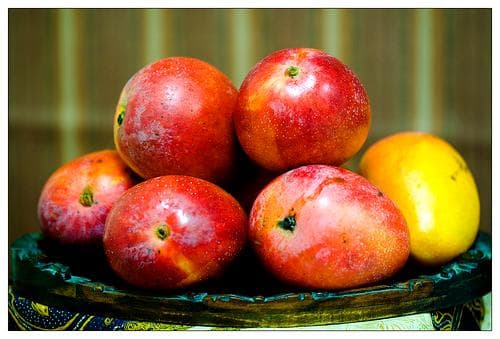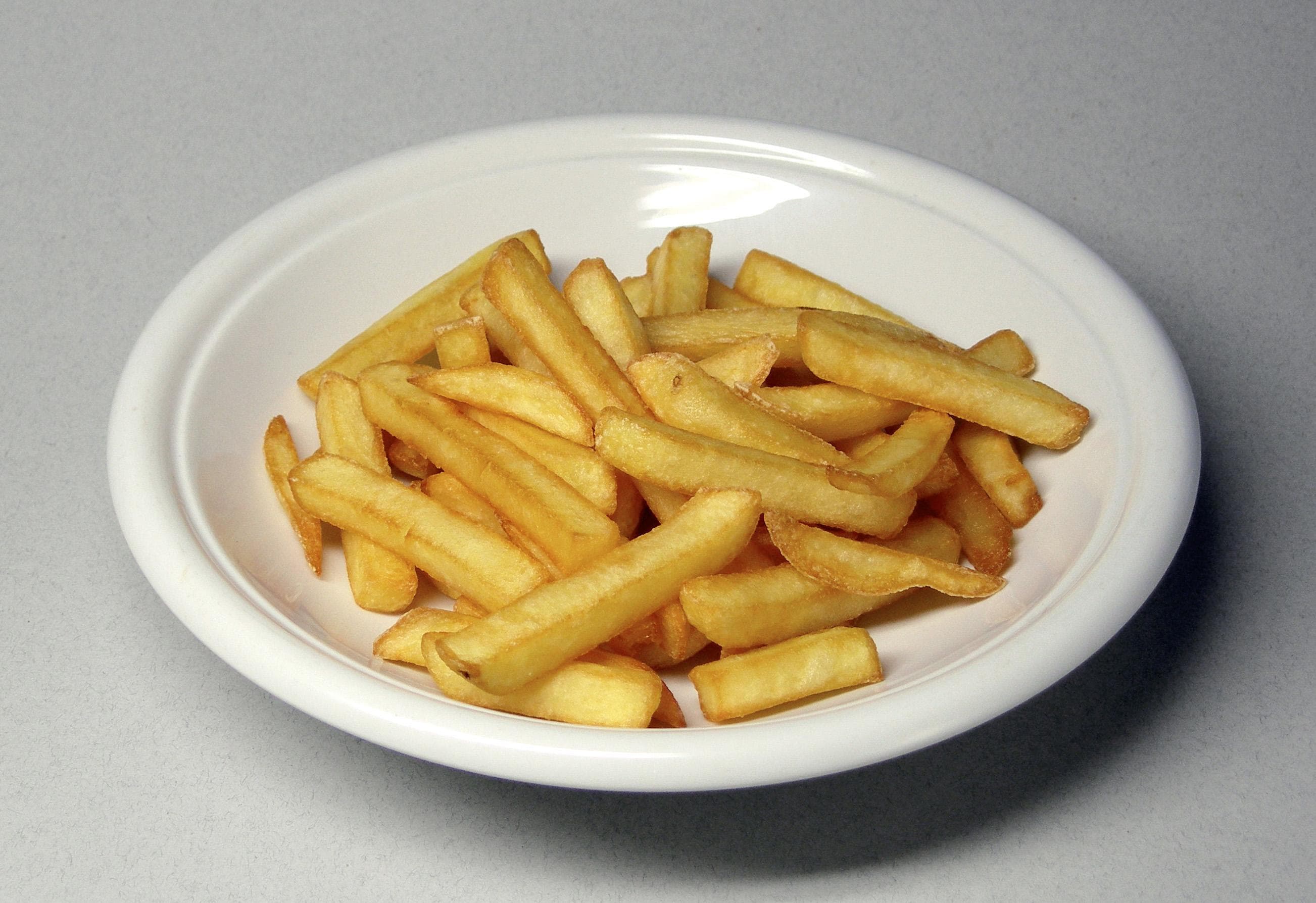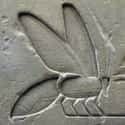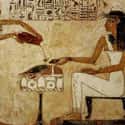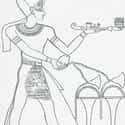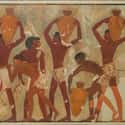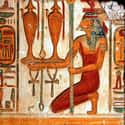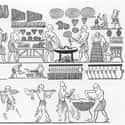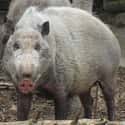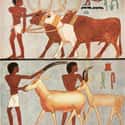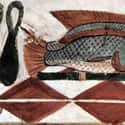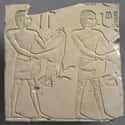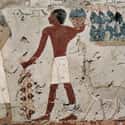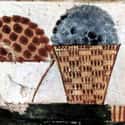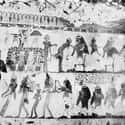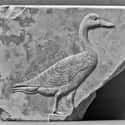-
(#1) Honey Was One Of The Most Prized Foods In Ancient Egypt
For the ancient peoples, honey was probably nothing short of miraculous. It can sweeten anything, moistens any dish that it’s baked with, and lasts forever, even when completely unpreserved. And ancient Egyptians thought of honey as something close to sacred.
Honey - and the bees that made it - played a huge role in the religious and political life of ancient Egypt. So much so that the bee was the official symbol of the king of the Lower Egyptian Kingdom.
Even the lower classes had some access to honey, which presumably means ancient Egyptians produced honey in vast quantities.
-
(#2) Some Ancient Egyptian Laborers Were Paid In Beer
For the ancient Egyptians, beer wasn't just an intoxicant, it was a source of nutrition and an essential part of everyone's diet - even children drank it. In addition, it was prescribed for dozens of ailments, as the Egyptians thought evil spirits caused diseases, and beer would confuse them and force them out of a person’s body.
If there's one thing that demonstrates beer's central place in the Egyptian diet, it's that laborers were often paid in beer for their work. Beer-based payment records are one of the ways we now know the Pyramids were not built solely by enslaved people, but instead by paid labor. Laborers who worked on the Giza Plateau were given three rations of beer every day as compensation for their work.
-
(#3) The Egyptians Used A Wide Variety Of Spices, Most Of Which Had Special Meanings
As befits a wealthy civilization, Egypt had access to the best the ancient world had to offer. In those days, spices were a luxury product. The Egyptians made great use of spices like cumin, coriander, and cinnamon; and as with their other foods, each spice had a medicinal or cultural significance.
Coriander represented romantic love and was considered to be an aphrodisiac. Cumin was a digestive aid and was considered a sign of faithfulness, often kept by those going on long journeys. Cinnamon was used in the embalming process for its preserving properties, but only sparingly, as it was one of the most expensive of the spices.
-
(#4) The Egyptians Both Produced And Imported Large Amounts Of Wine
Though there isn’t conclusive evidence to prove the origins of wine in ancient Egypt, historians believe the product was imported to the kingdom before 3000 BCE, and then quickly became a major agricultural product. While some wine was brought in from communities in Canaan and Mesopotamia, the ancient Egyptians produced a variety of wines, each with specific qualities.
Roman writers would later describe such Egyptian vintages as follows:
The white Mareotic from the Alexandrine region, pleasant, fragrant, diuretic.
The pale and somewhat oily Taeniotic, aromatic, superior to the Mareotic, mildly astringent.
The Thebaid, easily digested and suitable for fever patients.
The Sebennys, blended from various kinds of grape, among them the sweet Thasian which was known as a laxative.
-
(#5) They Made Wine Out Of Anything They Could Get Their Hands On
Once the basic process of making wine was discovered, it was a simple matter to start making wine out of any fruit with sufficient sugar or starch, and the Egyptians dove into winemaking with enthusiasm. Palm wine (made from the fermented sap of palm trees) was not only consumed, but it was also used as a cleanser during the embalming process.
The ancient Egyptian fascination with wines didn't stop there, however. Pomegranates, poppy seeds, carob trees, and the fruit of the pekha tree were all fermented and used to produce wines.
-
(#6) Bread Was A Symbol Of Hospitality And A Frequent Spiritual Offering
In some ways, the ancient Egyptian moral universe was similar to many of today's religions: good deeds were rewarded in the afterlife. Many wealthy Egyptians made public demonstrations of their charity, often by giving away bread to the poor. Indeed, bread was a symbol of hospitality, in terms of both charity and spiritual offerings.
Upon passing, the ancient Egyptian's ka (roughly analogous to the modern idea of the soul), continued to the afterlife. To ensure continued existence and ease of passage, though, regular food offerings were made at the tombs of the departed; or in the case of the pharaohs, to the monuments and statues they erected. This was taken so seriously that offerings were withheld from lawbreakers and sinners as a form of punishment.
-
(#7) Pigs Were Considered Unfit For The Wealthy
The ancient Egyptians considered pigs to be unclean. Curiously, however, they did raise pigs, and the poorer classes ate the animals somewhat regularly. During the era of the New Kingdom, pigs were quite common, with some local officials owning as many as 1,500 pigs.
One possible explanation for the view: the pig was one of the forms taken by the god Set, the god of chaos and the slayer of Osiris. As Egyptian theology developed, Set took on a more and more evil identity, and pigs were judged negatively solely by association.
On the other hand, it’s possible pigs were merely considered unclean because they rolled around in muck and dirt.
-
(#8) They Domesticated And Ate Whatever Meat Was Available To Them
As with most ancient societies, meat was a luxury predominately enjoyed by the rich. While the lush Nile Delta had its fair share of game, most of the meat eaten by the ancient Egyptians was from various forms of domesticated livestock, including goat, sheep, cow, and oryx antelopes. Also, meat was used as an offering, both at temples and interment services.
If not served immediately, meat was preserved in a wide variety of manners, including salting, brining, drying, smoking, and making pemmican, a fat and protein mixture.
-
(#9) Some Fish Were Considered Sacred, While Others Were Deemed Unclean
It's difficult to summarize the attitudes of ancient Egyptians on any one subject because the empire lasted for so long, was divided into so many periods and dynasties, and consisted of so many different people in vast geographical areas, each with their own religious and cultural attitudes. Nowhere is this more evident than in the ancient Egyptians’ view of fish.
Due to some religious connection between certain species of fish and certain gods, like Set, certain fish were considered sacred or unholy, clean or unclean, fit for the wealthy or only fit for the poor. This is further complicated by the Nile's array of aquatic life.
From the Greek historian Herodotus, we know the eel was sacred in the Late Kingdom, as were tilapia, carp, and some kinds of perch. It's unclear exactly how this worship was expressed, although numerous fish were identified with particular deities.
-
(#10) Poultry Was A Major Part Of The Kingdom's Nutrition
Goose was the most common form of poultry in ancient Egypt. They were domesticated and traded in all major cities, forming an essential part of the Egyptian diet. Duck was also commonly served at the tables of both the rich and poor.
While they were less common, there are also records of the domestication and consumption of pigeons, pheasants, and even ostriches. The chicken came relatively late to the Egyptians, around the time of the Ptolemaic dynasty.
-
(#11) Onions Had A Special Spiritual Significance
Onions have a rich and diverse history, both as a food and as a metaphor in literary and spiritual texts. For the ancient Egyptians, the onion was sacred. While it was traded and consumed as a foodstuff, it was also seen as an important metaphor, with its concentric rings symbolizing the infinite circles of eternal life.
As such, it's not surprising that onions were involved in many religious and funerary rituals. They were painted on the inner walls of the pyramids, they were left on the altars of the perished, and there is even evidence the entombed Pharaoh Ramses IV had onions placed in his eye sockets as symbols of eternal life.
-
(#12) They Used Dates, Figs, And Raisins As Sweeteners
While honey was often used as a sweetener by the rich, Egyptians who couldn’t afford much of it had to get a little more creative. Fortunately, they had access to the Nile and a wealth of date, fig and grape trees. Some of these fruits were simply eaten, while others were dried and preserved. The Egyptians would bake fruits into bread or use the juice to create a syrup.
As new civilizations grew around Egypt, the Egyptians imported new fruits. According to Reshafim.org:
Apple, olive, and pomegranate trees were brought to Egypt during the reign of the Hyksos or later. Mulberry trees reached Egypt from Armenia or Persia before or during the New Kingdom. Pears, peaches, almonds, and cherries were not introduced until the Roman period, but figs, grapes and the not always very tasty sycamore figs, which could be harvested from April to December, were known from early times. Coconuts were an imported luxury fruit affordable only to the rich.
-
(#13) The Upper Classes Loved Throwing Lavish Banquets
It was a custom in ancient Egypt to paint the best parts of a person's life on their tombs. These depictions have provided a great deal of evidence of the kinds of parties the rich used to have, and by all evidence, the Egyptians could throw a rager. It’s hard to know precisely what these parties were like, but what we do know indicates there was often lavish entertainment in the form of music, dancing, and even acrobatics.
And then there was the food. According to Tour Egypt, the parties included "rich dishes of butter and cheese, fattened fowl and beef, flavored with rosemary, cumin, garlic, parsley, cinnamon, and mustard, and sweetened with honey, figs and other fruits. Meat was a luxury in ancient Egypt, but at a feast, no expenses were spared."
-
(#14) Foie Gras May Have Its Roots In Ancient Egypt
The controversial practice of force-feeding geese to make the delicacy foie gras may have its roots in ancient Egypt. It's unlikely that ancient Egyptians were attempting to create an ancient equivalent to foie gras, though. Since ancient Egyptians force-fed cattle and hyenas as well, most historians have concluded they were trying to stimulate the production of animal fat.
The practice spread from Egypt to Greece, then from Greece to Rome, and has remained a part of European cooking ever since. While we don't know whether the Egyptians consumed goose liver the way modern foie gras eaters do, force-feeding geese was important enough to be depicted on numerous wall reliefs over the course of the kingdom's history.
-
(#15) Their Rich Diets May Have Contributed To Their Success As A Culture
Historians and archeologists generally pinpoint the transition from hunting and gathering to agriculture as one of the earliest major turning points in human civilization. If early humans were successful because of this transition to agriculture, then it follows the culture with the best access to agricultural techniques would build the most influential empire.
The Nile Delta, with its incredible amounts of fish, game, fruits, and vegetables, provided the nutrition the ancient Egyptians required to build large, population-dense cities. This, in turn, led to increased specialization and the scientific, cultural, and architectural breakthroughs for which ancient Egypt is known.
New Random Displays Display All By Ranking
About This Tool
The food history of ancient Egypt covers more than 3000 years, but the main characteristics of this food culture have remained unchanged until the Greco-Roman era. In ancient Egypt, whether rich or poor, the most common foods were bread and beer, accompanied by green sprouts onions, and other vegetables. For geographical reasons, ancient Egypt planted barley and wheat, which could be made into bread and beer. Ancient Egyptian foods played an important role in the development of food culture.
Most of the information about ancient Egyptian foods comes from pictures on the walls of tombs. We collected random 15 information about the foods that ancient Egyptians actually eat here.
Our data comes from Ranker, If you want to participate in the ranking of items displayed on this page, please click here.

